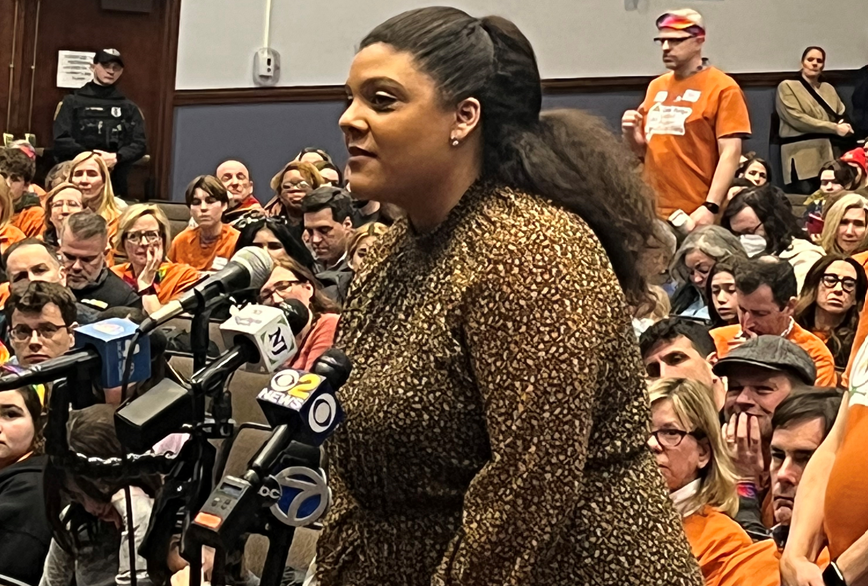Wait for what? New Jersey Needs Pay Transparency Now

For far too long, women and minorities have been left behind in an ever-widening wealth gap. New Jersey has a chance to narrow the gap through equitable hiring practice regulations. Assemblyman Paul Moriarity’s pay transparency bill (A3937) (as well as Assemblywoman Britnee Timberlake’s similar bill) would require employers to disclose “hourly wage or salary, or a range of the compensation” with each job posting. This saves time for both potential candidates and hiring managers as only applicants who find the compensation level satisfactory will then apply for the position. More importantly, it prevents the common (albeit unlawful) practice of short-changing new hires based on race, gender, immigration status or some other protected class.
The bill was up for discussion in the Assembly Labor Committee on March 23, 2023 but did not receive a vote to move it out of committee. Powerful lobby interests such as the New Jersey Business & Industry Association are asking lawmakers to take a “little bit of a wait-and-see approach." They have cited improper implementation in states that have passed similar bills as a concern. If they are truly worried about employers posting ranges that are too large or frivolous, the bill can be amended to require a good faith clause as found in the ordinance already adopted by Jersey City. However, the real reason seems to be that employers perceive the accountability measures outlined in the bill as a threat, as evidenced from the response from the Chamber of Commerce Southern New Jersey. The fact that industry lobbyists are proposing that there be no consequences for non-compliance should be a red flag for all.
Discriminatory practices in hiring such as inquiring about salary history and salary expectation work in favor of employers and increase pay disparity for women and minorities. In February of 2018, in his first executive order, Governor Murphy outlawed the practice of asking job applicants for salary history - the law took effect in 2020. By requiring employers to post compensation and wages, New Jersey will take the next step towards achieving pay equity.
The compounding effect of the pay gap follows women and minorities throughout their lives into retirement. It is estimated that American women retire with overall income that is 70% of their male counterparts. They literally cannot afford to wait anymore. The legislature must take action now to make pay transparency the law of the land in New Jersey and hold violators accountable.
Anjali Mehrotra serves on the board of the National Organization for Women (NOW) and is a member of the American Association of University Women (AAUW). Both organizations are leaders in the fight for pay equity.






The gender pay gap is nonsense. Women don't go into high risk jobs like nuclear engineering, petroleum engineering, chemical engineering, or even being carpenters, electricians or plumbers. Significantly more women are graduating college than men. Women are VOLUNTARILY taking jobs like teaching, social workers, psychologists, and the like. Why men and women go into different careers is a biological as well as sociological choice. Men are built differently than women, physically and mentally. College-graduated women in their 20s living in West Coast or East Coast cities (e.g., LA, NYC, D.C., Miami, San Francisco, etc.) usually out-earn college-graduated men in their 20s. by 17-20%. Then women get married and leave the workforce to raise children. Male incomes then start to skyrocket as they build their careers. The myth of a pay gap is just that--a myth. Women voluntarily choose their career and life paths. According to a number of studies, the pay gap in reality is about 9%. However, since men take more dangerous and higher pressure jobs overall, when it comes to being crushed, mutilated, electrocuted, or mangled at work, or higher rates of heart attacks and strokes, or other lifestyle diseases, men are at a distinct disadvantage. Most backbreaking, lethally dangerous jobs—roofer, logger, roustabout, and coal miner, to name a few—are done by men. That's why men are paid more. They do the more dangerous or high pressure jobs. The Labor Department reports that nearly 5,000 American workers die from workplace accidents each year. Ninety percent, more than 4,400, ARE male. We are often reminded that only 24 women are CEOs of the Fortune 500. But what about the Unfortunate 4,400?